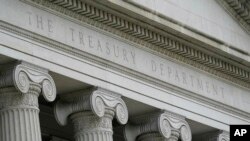"Americans can have confidence that the banking system is safe. Your deposits will be there when you need them," President Biden said in brief televised remarks from the White House in which he insisted taxpayers would not be on the hook.
Biden praised the "immediate" action taken by officials to shore up Californa-based Silicon Valley Bank, which failed last week and is now in federal hands.
In a joint statement on Sunday, the US Federal Reserve, the Federal Deposit Insurance Corporation (FDIC) and the Treasury Department said SVB depositors would have access to "all of their money" starting Monday.
They added that depositors in Signature Bank - a New York-based regional-size lender with significant cryptocurrency exposure that was shuttered on Sunday after its stock price tanked - would also be "made whole."
The Fed announced it would make extra funding available to banks to help them meet the needs of depositors, which would include withdrawals.
While the government is ensuring that SVB depositors get their money back, "no losses will be borne by the taxpayers," Biden said.
"The money will come from the fees that banks pay into the deposit insurance."
Biden said the management of the failed banks would lose their jobs and that shareholders would not have their losses covered.
"They knowingly took a risk and when the risks didn't pay off, investors lose their money. That's how capitalism works," he said.
But there were immediate signs of pressure at additional US lenders following the collapse and federal takeover of California-based Silicon Valley Bank, which roiled the global markets.
San Francisco-based First Republic Bank shares plunged around 75 percent, while Ohio-headquartered KeyCorp lost 28 percent and Zion Bancorporation lost 30 percent.
While major US indices veered in and out of positive territory, trading was uglier in Europe, with bourses in Paris, Frankfurt and Milan down around three percent or more.
"Far from calming nerves, fear of contagion has ramped up further with investors dumping risk assets across Europe," City Index analyst Fiona Cincotta told AFP.
"Banks are leading the charge southwards with investors taking aim at Spanish and Italian banks, suggesting that these are considered the weakest links."
- Recession risk rises -
Most financial market watchers are optimistic that the upheaval will not be comparable to the 2008 financial crisis.
Still, many forecasters see a rising risk of recession, especially in light of expectations that the central banks will continue to lift interest rates.
The next major move is expected Thursday when the European Central Bank meets for a likely half a percentage point interest rate increase.
- European stocks fall -
In Britain, banking giant HSBC bought SVB's UK division for just £1 ($1.2) in a rescue deal overseen by the Bank of England and the government. However, French and German authorities said there were no risks to their financial systems.
The British government's SVB UK rescue deal also guarantees deposits of customers, which includes major businesses in the technology and life science sectors.
EU economy commissioner Paolo Gentiloni told reporters that "we don't see it as a significant risk."
However, European stock markets fell deeper into the red on Monday and most Asian indices finished lower, with banks taking a hit.
Little known to the general public, SVB specialized in financing startups and had become the 16th largest US bank by assets: at the end of 2022, it had $209 billion in assets and approximately $175.4 billion in deposits.
Oxford Economics said in a note that the developments "should not have significant broader implications for the economy and are not a sign of systemic risks to the banking sector."
However, Oxford said the United States will probably undergo a "mild recession" in the second half of 2023.
"The Federal Reserve will continue to tighten until they break something," it said. "This is the first major sign of that happening, and as they continue to increase rates there are likely to be other signs."




